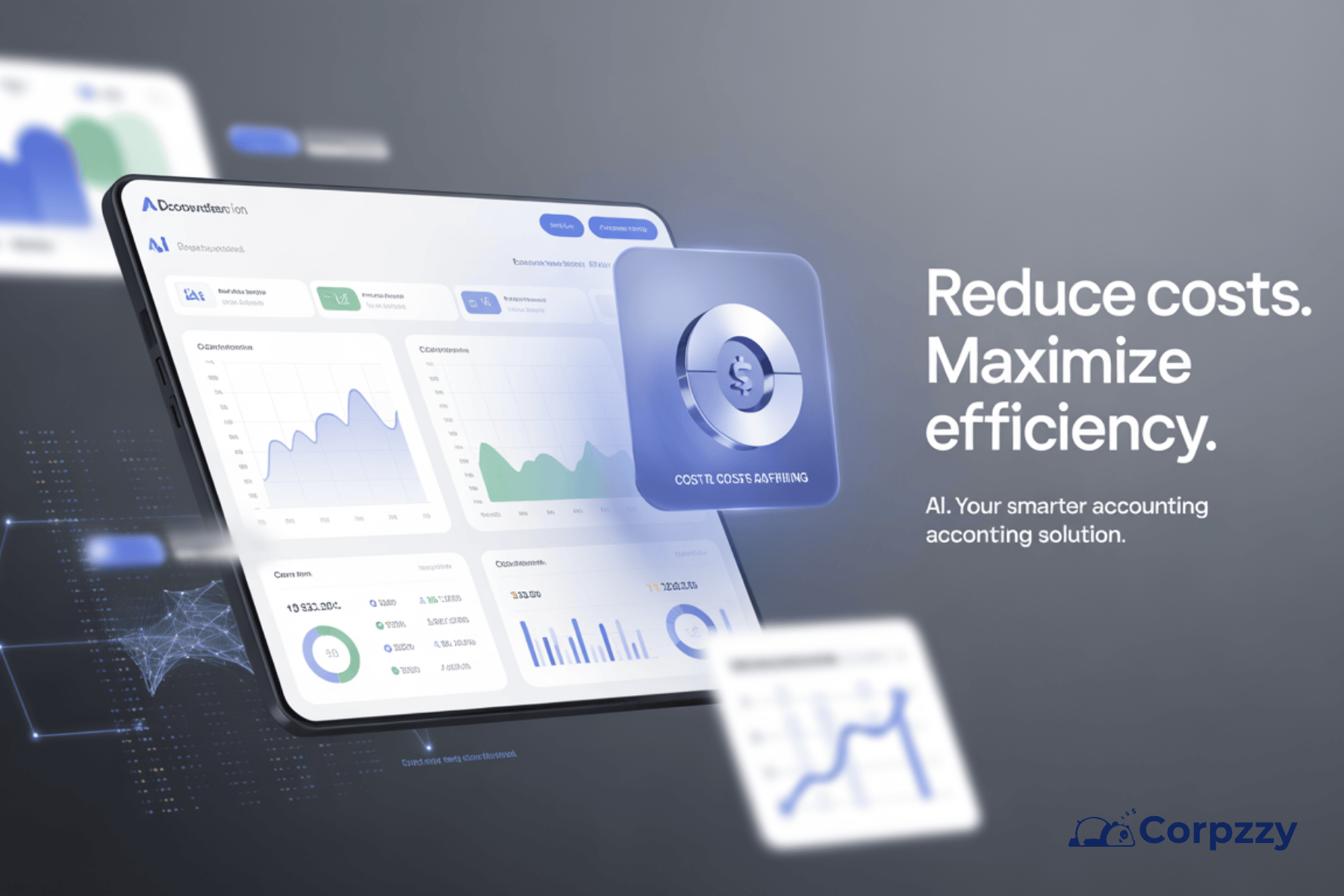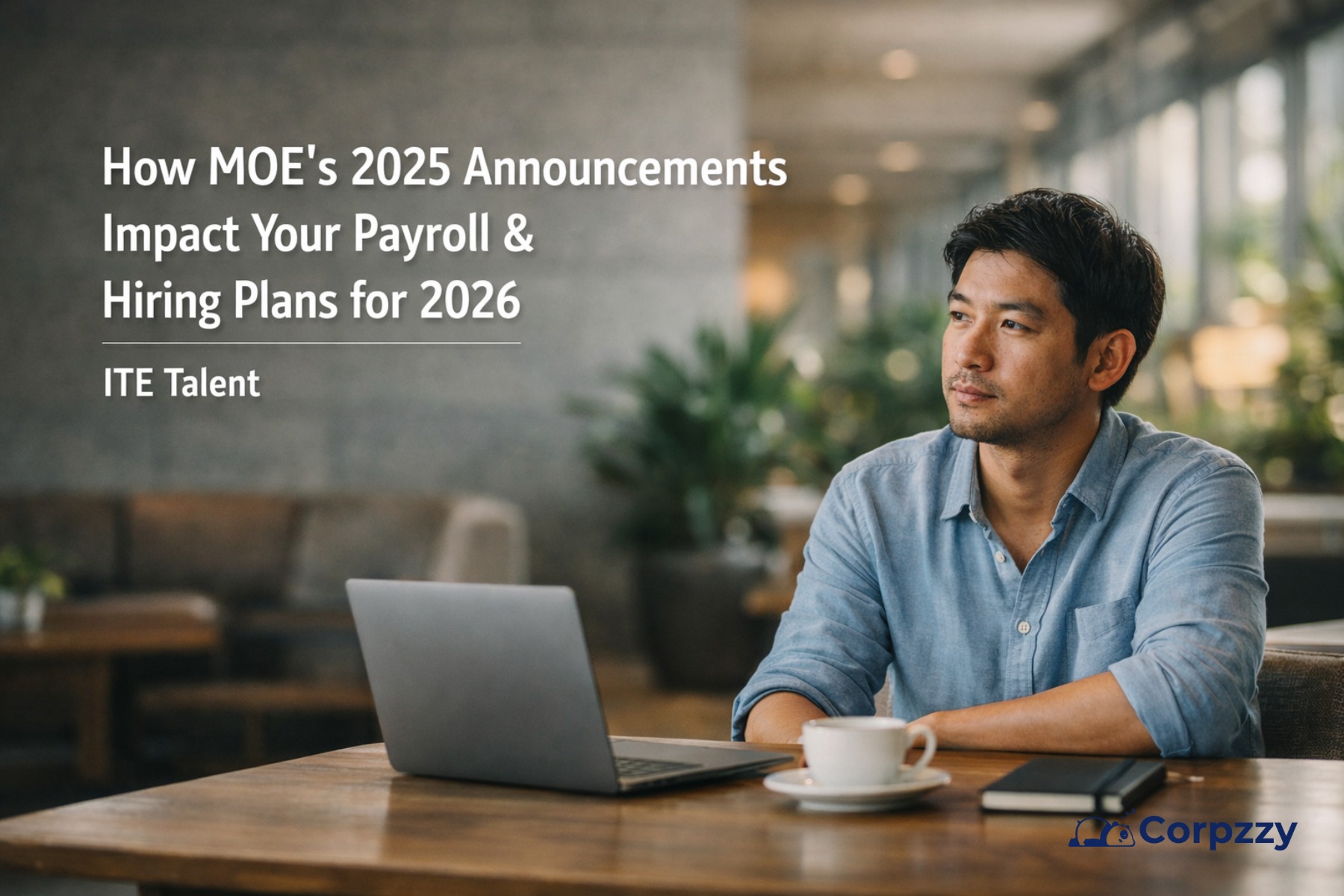Smarter, Leaner, Faster: How AI Is Slashing Accounting Costs for Singapore Businesses
Smarter, Leaner, Faster: How AI Is Slashing Accounting Costs for Singapore Businesses
Outline

Artificial Intelligence (AI) is rapidly transforming the accounting landscape by making processes faster, more accurate, and significantly more cost-efficient. Businesses, especially small and medium-sized enterprises (SMEs), are turning to AI tools to streamline their financial operations without increasing overhead. By automating repetitive tasks and reducing human error, AI is helping companies cut costs while improving accuracy and scalability. In Singapore, where regulatory compliance is critical, AI also ensures better alignment with IRAS and ACRA standards.
Key Takeaways
- AI cuts down manual labor in accounting through automated data entry and reconciliation.
- Businesses save money by reducing human error and outsourcing costs.
- Real-time compliance and audit readiness reduce the risk of penalties.
- AI enables scalability without increasing headcount or overhead.
- Integration with Singapore’s accounting systems ensures smooth financial operations.
Automated Data Entry for Faster Processing
One of the most time-consuming elements in accounting is manual data entry. AI-powered software can automatically extract data from invoices, receipts, and bank statements. This not only reduces the hours spent on entering numbers but also minimizes input errors. In Singapore, where tax reporting deadlines are strict, such automation helps SMEs stay compliant effortlessly.
These tools use Optical Character Recognition (OCR) and Natural Language Processing (NLP) to read documents accurately. Businesses can process hundreds of invoices a day without hiring additional staff. AI solutions like Xero and QuickBooks Online integrate seamlessly with local accounting software used in Singapore. This allows for streamlined workflows from day one.
Real-Time Reconciliation for Instant Accuracy
Account reconciliation can take days or weeks if done manually. AI tools perform real-time reconciliation by matching transactions across bank feeds and ledgers instantly. This not only speeds up month-end closing but also ensures accuracy throughout the financial period. With fewer reconciliation errors, SMEs in Singapore can focus more on strategic growth.
Real-time reconciliation is especially useful for businesses with high transaction volumes. It reduces the likelihood of discrepancies going unnoticed, which could lead to IRAS penalties or cash flow mismanagement. AI platforms flag inconsistencies the moment they arise. This gives finance teams greater control over business health.
Minimizing Human Error for Clean Records
Errors in accounting can lead to costly penalties, tax filing issues, and lost investor confidence. AI systems reduce human error by automating calculations and data validation. This ensures cleaner records and less rework by finance teams. In a regulatory environment like Singapore’s, accuracy is non-negotiable.
By detecting anomalies and outliers, AI helps businesses identify problems before they escalate. It also lowers the risk of fraud by validating transaction integrity in real time. Companies gain a trusted audit trail without additional manpower. This makes compliance more reliable and cost-effective.
Intelligent Forecasting and Budgeting with AI Tools
AI-driven platforms can analyze historical financial data and current trends to produce accurate forecasts. These tools help companies prepare budgets and predict cash flow without hiring analysts. In Singapore, where grant funding and cost efficiency are key for SMEs, better forecasting is a major advantage. Predictive models allow business owners to make faster, smarter decisions.
AI tools adjust forecasts based on changing variables, such as inflation or supply chain disruptions. This dynamic capability ensures financial planning stays relevant. Companies can simulate different growth scenarios without incurring consultancy fees. It enhances financial agility in a fast-paced market.
Scaling Without Increasing Headcount
As companies grow, transaction volumes increase. Traditionally, this meant hiring more staff to manage the additional workload. AI allows for operational scaling without proportional increases in labor cost. Businesses in Singapore can manage growing financial needs with leaner teams. This scalability is especially valuable for startups and fast-growing SMEs. AI handles larger datasets efficiently, reducing bottlenecks and delays. Automation frees up accounting staff for higher-level tasks. This creates a more productive and cost-effective finance department.
Replacing Basic Outsourced Functions
Many SMEs outsource bookkeeping to third-party firms, especially in Singapore’s cost-sensitive market. AI can replace functions such as data categorization, ledger maintenance, and bank reconciliation. By automating these tasks, companies save on monthly outsourcing fees. They also retain better control over their financial records. Internalizing these processes with AI tools improves data security and transparency. It reduces dependency on external vendors and lowers the risk of miscommunication. SMEs can maintain consistent financial practices while lowering costs. This gives them a competitive edge in managing limited budgets.
Time Savings That Drive Down Costs
AI can complete tasks in seconds that would take a human hours. This speed reduces labor costs and accelerates business operations. Tasks like tax calculations, financial report generation, and audit preparation are completed faster with AI. This ensures Singapore SMEs stay compliant and responsive. Time saved also means better cash flow forecasting and decision-making. When accounting data is up to date, business owners can act quickly. Faster workflows improve team efficiency across departments. Over time, this operational velocity translates into significant savings.
Enhancing Compliance and Audit Readiness
Singapore has strict tax and reporting standards governed by IRAS and ACRA. AI ensures companies remain audit-ready by maintaining organized records and documentation. Financial reports are auto-generated in compliance-ready formats. This lowers the need for manual prep before audits. AI flags missing documentation and out-of-scope transactions in real time. This allows businesses to correct errors proactively. SMEs can reduce the reliance on costly external auditors for compliance checks. Overall, the cost of staying compliant becomes predictable and manageable.
Continuous Learning for Ongoing Savings
AI systems improve over time by learning from new data. As businesses use them, the accuracy and efficiency of these platforms increase. This means fewer errors, more insights, and better cost control. Long-term use of AI leads to a compounded reduction in accounting expenses. Machine learning helps the software understand business-specific nuances. The more it’s used, the more tailored and effective it becomes. This reduces the need for constant updates or manual oversight. It’s a cost-effective solution that evolves with your company.
AI-Powered Invoice Management
Managing invoices manually can be labor-intensive and prone to delays. AI automates the process by extracting payment terms, due dates, and line items. This ensures invoices are paid on time and reduces late fees or duplicate payments. In Singapore, this efficiency contributes to stronger vendor relationships and healthier cash flow. AI also helps detect fraudulent invoices or irregular billing patterns. By identifying anomalies early, businesses can prevent financial losses. Invoice automation software often includes approval workflows. This reduces the need for manual checks and increases accuracy.
AI and Expense Management
AI tools simplify how businesses track and categorize expenses. Employees can upload receipts using mobile apps, and the AI automatically logs them into the accounting system. This eliminates paper trails and manual entry. Singapore-based businesses benefit from easier compliance with local expense claim rules.
Automatic expense categorization helps maintain accurate records for tax deductions. AI can also flag out-of-policy claims before they are reimbursed. This enhances internal controls and reduces fraudulent expense submissions. Over time, this minimizes leakage and controls overhead.
Integration with Singapore-Based Accounting Systems
AI tools now integrate easily with common accounting platforms used in Singapore. These include Xero, MYOB, QuickBooks, and local ERP systems. Seamless integration eliminates data silos and accelerates financial workflows. It ensures consistent reporting for IRAS and ACRA requirements.
Integrated systems reduce duplication of work and lower IT costs. They allow businesses to consolidate financial functions in one dashboard. Automation also simplifies the transition between incorporation, payroll setup, and monthly reporting. This results in a smoother and cheaper accounting process.
Enabling Strategic Reallocation of Human Resources
By automating routine accounting tasks, AI allows businesses to redeploy staff to more strategic roles. Instead of focusing on data entry or reconciliations, employees can contribute to budgeting, analysis, and growth planning. This shift improves workforce ROI.
SMEs in Singapore often have limited HR resources. AI helps them make the most of their finance team by focusing on high-impact activities. This leads to better decision-making and more effective resource utilization. Companies gain a strategic edge without increasing headcount.
Long-Term Financial Sustainability
Cost reduction through AI isn’t just a short-term benefit. It contributes to long-term financial sustainability by optimizing every aspect of the accounting lifecycle. From daily transactions to year-end audits, automation cuts down time and costs. Businesses become leaner and more adaptable.
Over time, the savings from AI adoption can be reinvested in growth areas. Whether it’s new product development, marketing, or market expansion, the capital freed from accounting costs creates more opportunities. This cycle of reinvestment strengthens financial resilience. It also improves business valuation in the eyes of investors.
Final Thoughts: AI Is the Future of Cost-Effective Accounting
AI is not replacing accountants; it’s making them more efficient and strategic. By automating routine tasks, reducing errors, and enhancing compliance, AI tools offer a clear path to reducing costs. In Singapore’s competitive and regulated business environment, these tools give SMEs a significant edge. Accounting no longer has to be a burden—it can be a business accelerator.
As more companies embrace AI in their accounting systems, the cost savings will compound. Businesses that invest in AI today are positioning themselves for greater operational success tomorrow. For SMEs aiming to scale in Singapore, AI is not just a convenience—it’s a necessity.
Frequently Asked Questions
Questions? We Have Answers
Related Business Articles
Share This Story, Choose Your Platform!


Artificial Intelligence (AI) is rapidly transforming the accounting landscape by making processes faster, more accurate, and significantly more cost-efficient. Businesses, especially small and medium-sized enterprises (SMEs), are turning to AI tools to streamline their financial operations without increasing overhead. By automating repetitive tasks and reducing human error, AI is helping companies cut costs while improving accuracy and scalability. In Singapore, where regulatory compliance is critical, AI also ensures better alignment with IRAS and ACRA standards.
Key Takeaways
- AI cuts down manual labor in accounting through automated data entry and reconciliation.
- Businesses save money by reducing human error and outsourcing costs.
- Real-time compliance and audit readiness reduce the risk of penalties.
- AI enables scalability without increasing headcount or overhead.
- Integration with Singapore’s accounting systems ensures smooth financial operations.
Automated Data Entry for Faster Processing
One of the most time-consuming elements in accounting is manual data entry. AI-powered software can automatically extract data from invoices, receipts, and bank statements. This not only reduces the hours spent on entering numbers but also minimizes input errors. In Singapore, where tax reporting deadlines are strict, such automation helps SMEs stay compliant effortlessly.
These tools use Optical Character Recognition (OCR) and Natural Language Processing (NLP) to read documents accurately. Businesses can process hundreds of invoices a day without hiring additional staff. AI solutions like Xero and QuickBooks Online integrate seamlessly with local accounting software used in Singapore. This allows for streamlined workflows from day one.
Real-Time Reconciliation for Instant Accuracy
Account reconciliation can take days or weeks if done manually. AI tools perform real-time reconciliation by matching transactions across bank feeds and ledgers instantly. This not only speeds up month-end closing but also ensures accuracy throughout the financial period. With fewer reconciliation errors, SMEs in Singapore can focus more on strategic growth.
Real-time reconciliation is especially useful for businesses with high transaction volumes. It reduces the likelihood of discrepancies going unnoticed, which could lead to IRAS penalties or cash flow mismanagement. AI platforms flag inconsistencies the moment they arise. This gives finance teams greater control over business health.
Minimizing Human Error for Clean Records
Errors in accounting can lead to costly penalties, tax filing issues, and lost investor confidence. AI systems reduce human error by automating calculations and data validation. This ensures cleaner records and less rework by finance teams. In a regulatory environment like Singapore’s, accuracy is non-negotiable.
By detecting anomalies and outliers, AI helps businesses identify problems before they escalate. It also lowers the risk of fraud by validating transaction integrity in real time. Companies gain a trusted audit trail without additional manpower. This makes compliance more reliable and cost-effective.
Intelligent Forecasting and Budgeting with AI Tools
AI-driven platforms can analyze historical financial data and current trends to produce accurate forecasts. These tools help companies prepare budgets and predict cash flow without hiring analysts. In Singapore, where grant funding and cost efficiency are key for SMEs, better forecasting is a major advantage. Predictive models allow business owners to make faster, smarter decisions.
AI tools adjust forecasts based on changing variables, such as inflation or supply chain disruptions. This dynamic capability ensures financial planning stays relevant. Companies can simulate different growth scenarios without incurring consultancy fees. It enhances financial agility in a fast-paced market.
Scaling Without Increasing Headcount
As companies grow, transaction volumes increase. Traditionally, this meant hiring more staff to manage the additional workload. AI allows for operational scaling without proportional increases in labor cost. Businesses in Singapore can manage growing financial needs with leaner teams. This scalability is especially valuable for startups and fast-growing SMEs. AI handles larger datasets efficiently, reducing bottlenecks and delays. Automation frees up accounting staff for higher-level tasks. This creates a more productive and cost-effective finance department.
Replacing Basic Outsourced Functions
Many SMEs outsource bookkeeping to third-party firms, especially in Singapore’s cost-sensitive market. AI can replace functions such as data categorization, ledger maintenance, and bank reconciliation. By automating these tasks, companies save on monthly outsourcing fees. They also retain better control over their financial records. Internalizing these processes with AI tools improves data security and transparency. It reduces dependency on external vendors and lowers the risk of miscommunication. SMEs can maintain consistent financial practices while lowering costs. This gives them a competitive edge in managing limited budgets.
Time Savings That Drive Down Costs
AI can complete tasks in seconds that would take a human hours. This speed reduces labor costs and accelerates business operations. Tasks like tax calculations, financial report generation, and audit preparation are completed faster with AI. This ensures Singapore SMEs stay compliant and responsive. Time saved also means better cash flow forecasting and decision-making. When accounting data is up to date, business owners can act quickly. Faster workflows improve team efficiency across departments. Over time, this operational velocity translates into significant savings.
Enhancing Compliance and Audit Readiness
Singapore has strict tax and reporting standards governed by IRAS and ACRA. AI ensures companies remain audit-ready by maintaining organized records and documentation. Financial reports are auto-generated in compliance-ready formats. This lowers the need for manual prep before audits. AI flags missing documentation and out-of-scope transactions in real time. This allows businesses to correct errors proactively. SMEs can reduce the reliance on costly external auditors for compliance checks. Overall, the cost of staying compliant becomes predictable and manageable.
Continuous Learning for Ongoing Savings
AI systems improve over time by learning from new data. As businesses use them, the accuracy and efficiency of these platforms increase. This means fewer errors, more insights, and better cost control. Long-term use of AI leads to a compounded reduction in accounting expenses. Machine learning helps the software understand business-specific nuances. The more it’s used, the more tailored and effective it becomes. This reduces the need for constant updates or manual oversight. It’s a cost-effective solution that evolves with your company.
AI-Powered Invoice Management
Managing invoices manually can be labor-intensive and prone to delays. AI automates the process by extracting payment terms, due dates, and line items. This ensures invoices are paid on time and reduces late fees or duplicate payments. In Singapore, this efficiency contributes to stronger vendor relationships and healthier cash flow. AI also helps detect fraudulent invoices or irregular billing patterns. By identifying anomalies early, businesses can prevent financial losses. Invoice automation software often includes approval workflows. This reduces the need for manual checks and increases accuracy.
AI and Expense Management
AI tools simplify how businesses track and categorize expenses. Employees can upload receipts using mobile apps, and the AI automatically logs them into the accounting system. This eliminates paper trails and manual entry. Singapore-based businesses benefit from easier compliance with local expense claim rules.
Automatic expense categorization helps maintain accurate records for tax deductions. AI can also flag out-of-policy claims before they are reimbursed. This enhances internal controls and reduces fraudulent expense submissions. Over time, this minimizes leakage and controls overhead.
Integration with Singapore-Based Accounting Systems
AI tools now integrate easily with common accounting platforms used in Singapore. These include Xero, MYOB, QuickBooks, and local ERP systems. Seamless integration eliminates data silos and accelerates financial workflows. It ensures consistent reporting for IRAS and ACRA requirements.
Integrated systems reduce duplication of work and lower IT costs. They allow businesses to consolidate financial functions in one dashboard. Automation also simplifies the transition between incorporation, payroll setup, and monthly reporting. This results in a smoother and cheaper accounting process.
Enabling Strategic Reallocation of Human Resources
By automating routine accounting tasks, AI allows businesses to redeploy staff to more strategic roles. Instead of focusing on data entry or reconciliations, employees can contribute to budgeting, analysis, and growth planning. This shift improves workforce ROI.
SMEs in Singapore often have limited HR resources. AI helps them make the most of their finance team by focusing on high-impact activities. This leads to better decision-making and more effective resource utilization. Companies gain a strategic edge without increasing headcount.
Long-Term Financial Sustainability
Cost reduction through AI isn’t just a short-term benefit. It contributes to long-term financial sustainability by optimizing every aspect of the accounting lifecycle. From daily transactions to year-end audits, automation cuts down time and costs. Businesses become leaner and more adaptable.
Over time, the savings from AI adoption can be reinvested in growth areas. Whether it’s new product development, marketing, or market expansion, the capital freed from accounting costs creates more opportunities. This cycle of reinvestment strengthens financial resilience. It also improves business valuation in the eyes of investors.
Final Thoughts: AI Is the Future of Cost-Effective Accounting
AI is not replacing accountants; it’s making them more efficient and strategic. By automating routine tasks, reducing errors, and enhancing compliance, AI tools offer a clear path to reducing costs. In Singapore’s competitive and regulated business environment, these tools give SMEs a significant edge. Accounting no longer has to be a burden—it can be a business accelerator.
As more companies embrace AI in their accounting systems, the cost savings will compound. Businesses that invest in AI today are positioning themselves for greater operational success tomorrow. For SMEs aiming to scale in Singapore, AI is not just a convenience—it’s a necessity.
Frequently Asked Questions
Questions? We Have Answers
Share This Story, Choose Your Platform!




